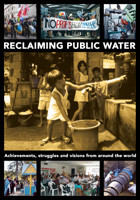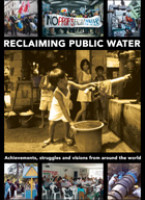Preface to Chinese edition of Reclaiming Public Water: Achievements, Struggles and Visions from Around the World
Topics
Reclaiming Public Water has been one of TNI's most successful publications, obviously meeting a need in many countries and many languages. The latest in the series, which includes Spanish, Bahasa Indonesian, Italian with more to come, is Chinese, in a translation undertaken by our friend in Hong Kong, Au Ly. This is my preface, which he has now also translated. The book will be mostly distributed in Hong Kong [where people are fighting against privatisation of the public water system] and Taiwan, but Au has hopes that through the internet, people in mainland China will also be able to access it.

Authors
When I first read Reclaiming Public Water in English shortly after its publication in 2005, I liked it especially for its many grass-roots contributions. I can think of no one except the Corporate Europe Observatory-Transnational Institute team and their several partners around the world who could have produced such a book, with so many authors, from so many places. Who else had such expertise? You had to know the water question intimately and internationally, you needed to be familiar with any number of popular struggles in order to ask the right people to write for it.
The great virtue of this text is consequently that all the chapters are written by people who know what they're talking about. No wasted rhetoric, no baseless claims, just the facts and, more often than not, the description of a struggle by those who participated in it. These are hands-on, no nonsense contributors. And for the Chinese edition, we have the benefit of a similar, excellent contribution from the Government Waterworks Professionals Association [GWPA] who own struggle in Hong Kong is for the moment inconclusive.
Now, however, that I have the honour of prefacing the Chinese edition of Reclaiming Public Water, it is a good moment to look more deeply at the reasons this book has filled a gap and has had such great success in several languages, as I feel sure it will have in Chinese as well.
The first reason is that everyone recognises that water is special. We humans are mostly made of it and nothing on earth can live without it. It is banal to point this out, but necessary, because the reverse side of this apparently trivial observation leads to serious consequences. Here we have a substance which is absolutely necessary to all life, human and otherwise. There is no substitute for it [although as a French citizen I sometimes joke that the French would perhaps like to substitute wine...]. And, at least until desalinisation of sea-water becomes economical for supplying large populations, it is often in short supply. Fresh, sweet water only represents about 3 percent of the world's water and the Pentagon and others are preparing for water wars in our century as nations are expected to fight over this precious resource.
Given all these characteristics, what substance could be more ideal for the private sector, especially for transnational corporations? Water is a dream commodity and that is why corporations want it to be just that: a commodity. People must have water or die; they can't use anything else in its place, they will pay whatever they must to obtain it. The new chapter by the Hong Kong GWPA tells an old story. The private sector is currently singing its siren song to the public authorities - "We will provide you with more perfect technology, we will supply better service with greater efficiency": people all over the world have heard this song before and they have learned it is a lie. This book documents the extent of that lie.
Throughout the world, privatisation has, in every sector and everywhere it has been tried, led to higher prices, lower quality, less efficiency and a total lack of interest in customers of modest means unable to pay premium rates. Huge stacks of evidence exist to prove this point, from Margaret Thatcher's massive privatisations in Britain; to the World Bank-International Monetary Fund-sponsored privatisations under the Structural Adjustment programmes applied in over a hundred countries. The fashion for privatisation, which could also be called "alienation" or simply a "sell-out", has been with us for about 25 years and we know what the consequences are. This book contains many examples. Privatisation means nothing more than handing over the results of the work of thousands of people over decades - in the case of Hong Kong over 150 years - with virtually no guarantees.
These negative outcomes of privatisation should not be seen as surprising. They are to be expected, particularly when the private service provider enjoys a monopoly, as is almost always the case with utilities like water. If water has been until recently a public monopoly in most of the world, it is for good reasons. Water treatment and distribution do not benefit from competition as ordinary manufacturing or services businesses might do. It is usually far preferable to have a single authority overseeing the whole of the network, in command of its various components, because in some cases, which economists call "natural monopolies", having a single authority is the best way to arrive at the greatest efficiency, quality of service, fairness in price and so on.
When a private, for-profit corporation gets its hands on a "natural monopoly", however, it behaves exactly as it is supposed to do. It goes after profit, the higher the better, and it cuts costs, often by massive lay-offs of personnel but also by often neglecting the infrastructure. Poorer neighbourhoods get worse [or no] service. More money goes into paying high salaries for the [usually foreign] managers. If Hong Kong goes down the privatisation road, free water, like the free first 12 cubic metres enjoyed by every Hong Kong household every four months, would be abolished faster than you can say "Hong Kong Special Administrative Region Government". If a public entity truly needs help in improving its water distribution and treatment, instead of looking to the private sector, it should seek out a public-public partnership [see the case of South Africa in this book].
None of this is to say that public water provision has never encountered any problems anywhere. Of course it has. Sometimes public administrations are inefficient or even corrupt. But when that is the case, popular struggles should be directed at fixing the problem, not at destroying a public service in favour of privatisation. As one of the officials of the Public Services International [the Union of public service trade unions], Mike Waghorne, is fond of saying, if your sink leaks or your paint is peeling, you don't burn down or sell the house - you fix the sink and repaint.
My fervent hope for this Chinese edition of Reclaiming Public Water is that it will be seen by readers not just as informative and revealing - although it is both, but as genuinely useful. This book is that rare publication: a time-saver and a tool. Readers will understand why it is worth fighting for public water; what the consequences can be if they don't, and how other people, in other communities, have managed to win the battle against privatisation and give-aways of public goods. They will also learn of some of the mistakes to avoid.
The cases described here concern water-systems in small and large communities; well-known cases like the water-wars in Cochabamba, Bolivia and others that have been much less publicised; struggles carried out in rich societies and poor ones; outcomes where people have won definitive results and others where dangers are still present - there is a great variety of examples.
Allow me to add just a word to this record of democracy in action. It is possible to establish very broad, winning coalitions for reclaiming public water; broader perhaps than for any other common objective, because almost everyone, in all sectors of society, with the exception of the transnational corporations themselves, has an interest in safeguarding the water supply. May Chinese-speaking readers, though their own actions, add many chapters in the future to this inspiring record.

